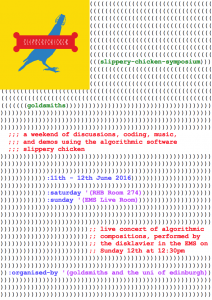I did a recording session with the disklavier on Friday. Velocity 90 is massive. Don’t go above 90.
Tag Archives: slippery chicken symposium
Some of you will already know the rm…
Some of you will already know the rm-repeated-pitches method. This finds repeating pitches in any or all voices of a slippery-chicken object and replaces them with other pitches from the current set. Of course what this is doing is ironing out some of the problems inherent to algorithmic pitch selection, and slippery chicken’s in particular.
For the Goldsmith’s project next month I’ve developed a related method called add-auxiliary-notes. This tries to deal with some of the static pitch structures that arise out of limited but extended harmonic fields. It analyses slippery-chicken voices phrase by phrase to find the most frequently used notes, then changes some of them (according to an activity-levels object) to auxiliary notes (up a semitone by default but any and varied intervals are possible). It’s already available on the SVN server so those of you who want it will find it along with documentation in the file slippery-chicken-edit.lsp after doing (update-app-src …)
If you who read facebook slippery chicken group…
If you who read facebook slippery chicken group posts you may remember this one about pedalling:
“Those of you working on piano pieces: as of yesterday, if you add one of the three pedal marks ‘ped, ‘ped-up, or ‘ped^ you’ll get the correct controller information written to your MIDI files for free—in other words, during MIDI playback the sustain pedal should work.
If you want to set the controller message of an event yourself, just e.g.
(push '(1 64 127) (midi-control-changes event))
where the first 3-element list there is (midi-channel controller-number value). 64 is the sustain pedal controller number; 127 will depress and 0 will release.If you need this functionality do (update-app-src …)”
Just wanted to update this to mention that this will also work with the ‘uc and ‘tc marks (una corda / tre corde) and the ‘sost and ‘sost-up marks (middle / sostenuto pedal), i.e. not only will the pedal marking appear in the score but the MIDI controller data will be written when you call midi-play.
I have never quite been able to separate…
I have never quite been able to separate my sadness at the loss of Luigi Nono from a feeling of greater awareness, of happiness and gratitude that he ever existed—and ever existed in our proximity. And despite the loneliness which I share with so many others who loved him, I feel, when I think of him, a unique sense of the triumph of art and a hope that its restless force will endure in times of apparent hopelessness.
Helmut Lachenmann

